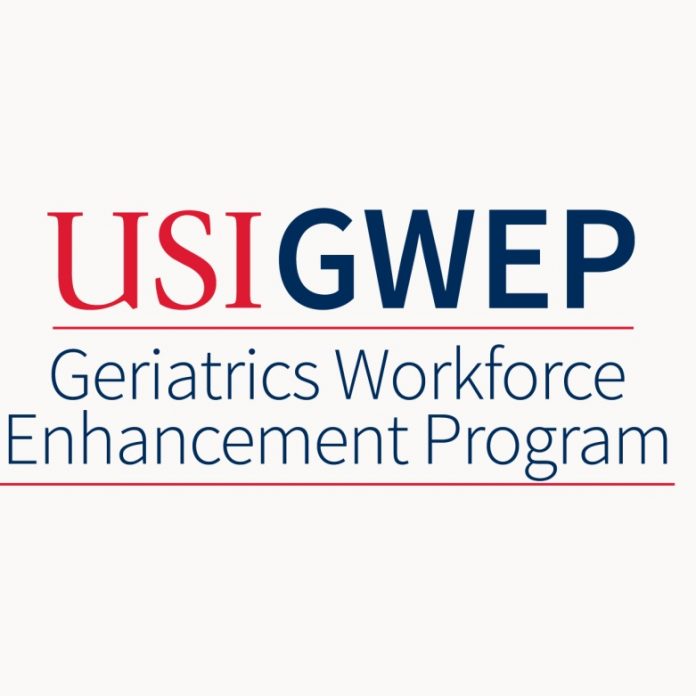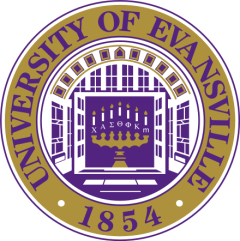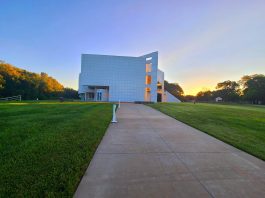For the second year in a row, the University of Southern Indiana Geriatrics Workforce Enhancement Program (GWEP) has received additional funding from the Health Resources and Services Administration (HRSA) of the U.S. Department of Health and Human Services (HHS). This year, the amount of supplemental funding is $122,011, and it will be used to support several initiatives related to nursing staff training in academia and long-term care settings.
“This supplemental funding enables the USI GWEP to enhance the partnerships we have with academic institutions and nursing homes,” says Katie Ehlman, Director of the USI Bronstein Center for Healthy Aging and Wellness and Professor of Gerontology. “Last year, we focused on several initiatives related to nursing home staff education, recruitment and retention with a goal to educate and support the workforce while also improving the lives of older adults. We plan to build on our success again this year.”
Amy Pierce, USI Instructor in Nursing, has worked with the GWEP to incorporate a Dementia Live® simulation into the curriculum of a USI undergraduate nursing course, Care of Adults through the Lifespan. “Dementia Live is a high impact, dementia simulation experience that immerses students into life with dementia, resulting in a deeper understanding of what it’s like to live with cognitive impairment and sensory change,” she says. “The intent of this simulation is to provide training for nursing students to promote knowledge, understanding and empathy when providing care for persons living with dementia. Overall, students have found the simulation beneficial.”
Pierce said other additions to the nursing course include information on age-friendly care and Teepa Snow’s Positive Approach to Care® techniques. “An age-friendly system follows a set of evidence-based practices, called the 4Ms framework which aligns with what matters most to the older adult and family caregivers,” she says. “With the Positive Approach to Care, faculty mirror the techniques of Teepa Snow to teach nursing students how to best interact with and care for those with memory loss.”
During the fiscal year 2022-23, the GWEP’s nursing home partners utilized dementia and the age-friendly curriculums, and several staff members received the Dementia Live coach certification. To address resilience, partnering nursing homes selected one staff member to be trained as a Mental Health First Aid Instructor.
For the fiscal year 2023-24, the GWEP will continue to utilize the dementia and age-friendly curriculums to educate the nursing home workforce and will be rolling out a new ageism presentation, in addition to other new initiatives.
According to Ehlman, the Indiana Department of Health requested that the USI GWEP team recommend changes to the dementia component of the CNA state-approved curriculum. The nursing faculty review process will include an assessment of the materials from the HRSA Health Workforce, Train Health Care Workers About Dementia website. Learn more.
She said this year’s partners for the nursing home supplemental funding project are the Southwest Indiana Area Health Education Center (AHEC), the USI Bachelor of Science in Nursing (BSN) Program, Oasis Dementia Care, two skilled nursing homes and two high school certified nurse assistant (CNA) partners (to be determined).
The GWEP’s objectives for this funding period include:
- Develop or enhance evidence-based practice curriculum on nursing home care of older adults, including those living with dementia, within the context of the Age-Friendly Health Systems’ 4Ms Framework for potential nursing staff.
- Develop or enhance evidence-based practice curriculum on nursing home care of older adults, including those living with dementia, within the context of the Age-Friendly Health Systems’ 4Ms Framework for potential nursing staff.
- Partner with at least one accredited school of nursing and one certified CNA program to develop or enhance culturally competent curriculum.
- Partner with one nursing home to develop and/or enhance experiential care learning opportunities for student nurses and CNAs student/staff to encourage recruitment and retention to practice after graduation.
The USI Bronstein Center for Healthy Aging and Wellness is a long-standing partner with Snow and her Positive Approach to Care Company with 10 years of collaborative work. Snow is a dementia care specialist and an Occupational Therapist by training. She has developed a method called the Positive Approach to Care which recognizes what a person with brain change retains.
The USI GWEP has six previously recorded workshops taught by Snow, designed specifically for professional/formal nursing home caregivers. The USI GWEP team has published a link to video request forms on the website, and they are accessible to nursing home staff members.
The topics covered are:
- Recognizing and Responding to Exit-Seeking
- Person-Centered Care: Who Am I, and Why Does it Help Your Staff?
- Supporting Staff to Prevent Abuse and Neglect
- Dementia and End of Life
- Activities and Engagement to Prevent Challenging Situations
- Sexuality, Intimacy and Dementia
In an effort to offer pathways for advancement, enhanced education and improved wages, the USI GWEP will work to build an instruction pilot for a CNA Pre-Apprenticeship program. The groundwork for a pre-apprenticeship program will be established working in partnership with AHEC, Leading Aging and Indiana Healthcare Association and a Department of Labor intermediary.
For more information or to get involved with the USI GWEP, visit USI.edu/gwep.
This project is supported by the Health Resources and Services Administration (HRSA) of the U.S. Department of Health and Human Services (HHS) as part of an award over $3,691,706 million with zero percentage financed with nongovernmental sources. The contents are those of the author(s) and do not necessarily represent the official views of, nor an endorsement, by HRSA, HHS or the U.S. Government.




